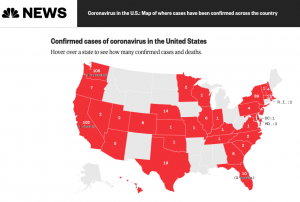Children and Coronavirus: Stats and Facts as of 3/12/20
Should you be worried about your children catching COVID-19?
I’ve gathered up all of the most recent facts and stats for you right here to let you decide.
Complications, as well as the risk of getting the virus, seems to increase with age.
Right now the stats say that the majority of COVID-19 cases (87%) are in people 30-79. Only 8.1% of cases are in people in their 20s, 1.2% in teens, and 0.9% are in 9 and under.
Does that mean that kids aren’t at as high of a risk for getting infected? Not necessarily.
This low number may mean that cases in children are underreported. Children might be getting it but it doesn’t get documented that they’ve contracted the virus. That’s because most of the time children show no symptoms of the virus or the symptoms are mild enough that they tend to escape detection.
So, it may be not that they aren’t getting infected, it’s that they aren’t getting the disease–they aren’t getting sick.
As of March 11, worldwide, no one under the age of 9 has died from the virus and only 0.2% between 10-19 die from the virus, according to the CDC. Compare this to the flu, which has killed 136 children in the U.S. so far this season.
What are the symptoms in a child with COVID-19?
Disease signs in children include those of a bad cold: cough, congestion, headache, and runny nose–all easily mistaken for any other cold virus. Sometimes there’s diarrhea/vomiting, but not often. Even if these symptoms don’t appear, an infected child can still spread disease. and it could easily infect a person who may succumb to it, such as an elderly person or someone who is immunocompromised.
If kids aren’t getting sick, when should you be concerned?
Children with chronic medical conditions are at higher risk for complications. Kids with asthma, for example, are at particularly high risk for pneumonia from COVID-19.
What do you do for an immunocompromised child?
Follow standard precautions with all children such as washing hands with soap and water, avoiding people who are sick, and not touching the face, eyes, nose, and mouth. There’s no need to put a facemask on your healthy child. Beyond that, distance your immunocompromised child from large social gatherings and in places where outbreaks are known.
Parents, if you or your child is sick with anything, please stay home. No matter what it is, spreading any disease to other people, especially immunocompromised people, could be deadly.
Related resources you may find helpful:
- Education Week: Children and Coronavirus: 4 Questions Answered
- CDC: Talking with children about Coronavirus Disease 2019: Messages for parents, school staff, and others working with children
- QUICK FACTS AND INTERESTING TIDBITS ABOUT CORONAVIRUS 2019 AND COVID-19
- Daily U.S. Coronavirus Updates at The Vaccine Mom
- Johns Hopkins Coronavirus COVID-19 Global Cases Tracker
- Bloomberg’s Mapping the Coronavirus Outbreak Across the World
- Worldometer for current U.S. case and death count
- CDC Coronavirus Disease 2019 (COVID-19) page
- WHO Coronavirus Disease (COVID-19) Outbreak page
- NBC News live updates


